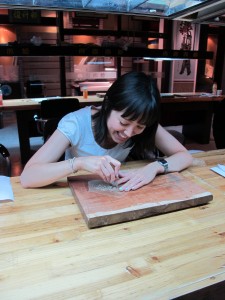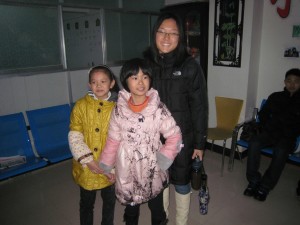 Cultural exchange has a way of sneaking up and surprising you. At times, it feels so basic: communicating in a foreign language, acclimating to the constancy of strange foods and choosing whether to use the sit or squat toilet. In the beginning, the simple logistics and practicalities of basic exchange are all consuming. Over time, it becomes natural to cross the street with the flow and not with the light. But something else is happening too – and has been happening. Slowly, very, very slowly, so as not to wake your consciousness, the real exchange starts to happen.
Cultural exchange has a way of sneaking up and surprising you. At times, it feels so basic: communicating in a foreign language, acclimating to the constancy of strange foods and choosing whether to use the sit or squat toilet. In the beginning, the simple logistics and practicalities of basic exchange are all consuming. Over time, it becomes natural to cross the street with the flow and not with the light. But something else is happening too – and has been happening. Slowly, very, very slowly, so as not to wake your consciousness, the real exchange starts to happen.
It’s been this way with me. Sneaking up slowly, in miniscule increments until it rains down.
I’m spending my Fulbright year canvassing China to meet and work with the remaining traditional Chinese Shadow Puppetry artists. On and off for the past six months, I’ve been in Xi’an under the tutelage of hand cut leather shadow puppet master Wang Tian Wen and my progress up until this point has been slow and stuttered. Recently at the cutting studio, I finally – let me emphasize that better – finally figured it out. It is hard to explain. It’s also known as an Aha! moment; an instant where your brain connects with your body, your body connects with your memory and all of them converge in the present moment. The power of all three coming together at once creates a force of realization that expands beyond the thing at hand.
I was hand-cutting my piece of translucent leather, rushing a bit here and there, pondering everything but the task itself. Why is KFC so much better in China? Don’t forget to add money to my bus card. Why is my left arm aching? What am I having for lunch? Why can’t I ever get this cut right? That’s when I heard myself say slow down. I must say this a dozen or so times a day while I work. I work fast out of habit because of deadlines, time crunches, graduate school and because it’s the accepted pace of life in the United States. Back home, my ability to multitask, work quickly and pack the activities is a point of pride. But there was something different about this day that came after many months of these fast-paced days.
The morning had started off slow and steady with a few genuine exchanges, first with my neighbor, then on the bus and finally with my favorite street vendor. I flowed with the foot traffic instead of the streetlight. When I arrived at the studio, everyone was napping, chatting or working calmly. It all created a strange quietness. So when I told myself to ‘slow down’ this time, I finally heard myself.
So I tried it. I slowed down. I glanced down at my hands and took a deep breath and moved s l o w l y. To me, it looked like I was moving in slow motion. And given my standard pace, I was.
At first, it felt so odd and silly. But my tired mind and body insisted on persisting. Within the space of a long minute, I was paying attention to different things. Not how I was doing, but what I was doing: the simple act of cutting. The cowhide determines your pace; your blade must take time to negotiate with it and your hand, the willing accomplice.
I focused on my slow motion cowhide being pushed ever so slowly onto my upturned blade. Cut after cut after cut. After a while, my dry eyes blinked me back into consciousness. I looked down at my work.
Aha! This was it. This is what it takes to cut a puppet. My cuts had the quality I had been looking for, something I could find sometimes by accident, but not with any consistency. I laughed loud enough to make my friend Wang Yan look up at me. I’d been rushing to find the key to cutting puppets and it had simply been to slow down.
The assumption I held just before I started my Fulbright grant was that I would learn about shadow puppetry. I have, and more. I didn’t expect to learn the larger ways in which cultural exchange can change us. Working with artists from China has completely changed my creative process, design aesthetic, work ethic and collaborative methods…not to mention my life. If and when you can, slow down during your Fulbright year. Stop and take stock of the large and small ways in which your host country has changed you, and you, your host country.
When working on your Fulbright application, take special care to clearly form your project idea and present it in a way that shows your passion and commitment. The clearer your proposed project, the more likely your realized project will be a success.
This article was adapted from my blog A YEAR IN SHADOWS. To read more stories about my Fulbright research on traditional Chinese Shadow Puppetry, click here.
Photo: Annie Katsura Rollins, 2010-2011, China, cutting leather puppets at the Yutian Wenhua Company in Shaanxi Province


 On September 2, 2009, I arrived in
On September 2, 2009, I arrived in